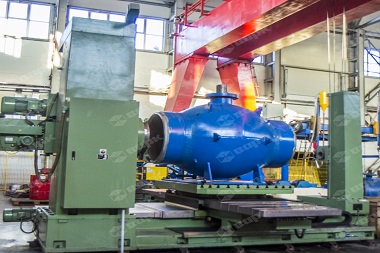Ball Valves
A ball valve has a rotary ball with a hole and is placed inside a stem. A handle is attached to the stem that operates the ball. Using the handle, you can rotate the ball to close and open the valve. The handle will turn only 90 degrees; hence it is also called a quarter-turn valves. When the handle is kept parallel to the pipe, the valve will open, and it is closed when the handle is placed perpendicular to the pipe.

Gate Valves
A gate valve has a gate fixed to the stem to control the flow of the material. A gate is a solid disk that is lifted and returned to open and close the valve. A bonnet controls the gate. Rotating the bonnet clockwise and anticlockwise will open and close the valve. You need to rotate 360 degrees to open the valve completely, and hence it is also called Multi-Turn Valve.
Also Read : Handling Wear And Tear On Ball Valves
Speed of operation and the flow is important in valves as abrupt operation, and flow may cause water hammer risk. A rapid shut off will abruptly stop the flow, which will build pressure caused by the momentum of the operation. An increase in pressure creates a noise that sounds like a hammer hitting the pipe. This phenomenon is called a water hammer. Frequent water hammer will cause a rupture in the pipe leading to leaks in the system.
Some of the differences between the two valves based on the operation are –
Ball Valves -
Gate Valves –
When choosing between the valves for your industrial project, consider the following selection criteria so you don't go wrong.
Both gate and ball valve are used in commercial, industrial and residential applications. Let us take a closer look at the different applications that suit gate and ball valves.
Ball Valves –
Due to its fast opening and closing operation, ball valves are most suitable for any emergency applications that require fast turn off/on operation. Applications that require a tight seal like natural gas make use of ball valves. All new plumbing systems in residential projects use ball valves as it requires frequent shutoffs. Fire protection and marine systems also use ball valves.
Gate Valves –
Gate valves are used in systems that do not require frequent shutoff. It is more commonly found in old plumbing systems. Applications that use viscous material and slurry use gate valves as easier to maintain and clean than ball valves. Hence, the pharmaceutical, beverage and food industries use gate valves. High pressure and temperature applications like water treatment, mining and power plants also use gate valves.
At Oilway, the top industrial valve supplier in Indonesia, we manufacture and deliver high-grade petroleum machinery and industrial valves. We implement stringent quality protocols and the latest manufacturing processes. Call us to learn more.